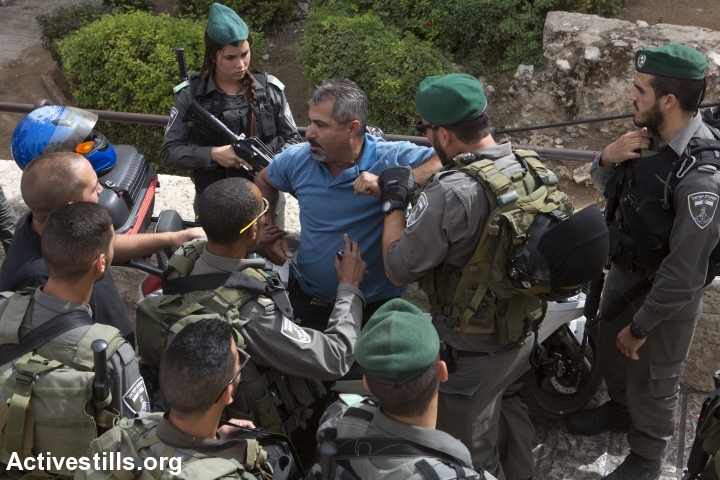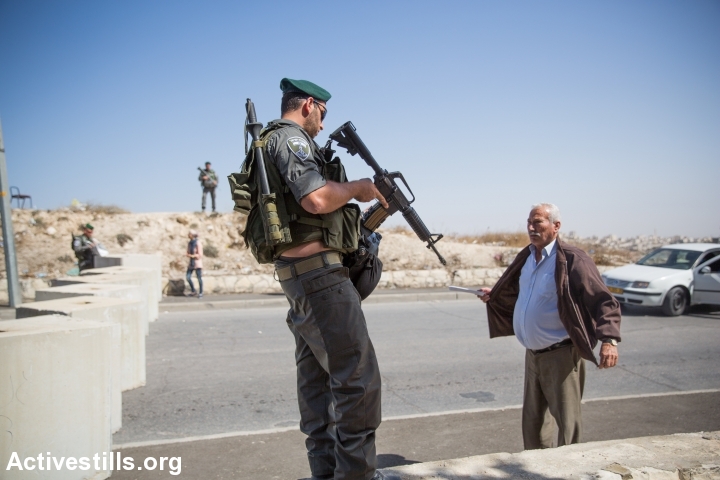From checkpoints and soldiers to the fate of our children, fear is everywhere in East Jerusalem these days.
By Fuad Abu Hamed

Friends, I want to tell you about what is happening to us in East Jerusalem. Even today, hundreds of thousands of Palestinians in Jerusalem live a life of fear. This kind of situation is completely unprecedented.
Palestinians fear having their residency revoked; they fear being cut off from their city, from Al-Aqsa Mosque, from the Old City, from their families, from their schools. Every morning dozens of people try to rent or buy an apartment on the Israeli side of the wall; Palestinians who live in neighborhoods of East Jerusalem where a wall is planned live in the same fear; they feel this is part of a process — that their turn is yet to come.
There is a fear of the cruel closure that continues to disrupt the lives of the residents, causing students, doctors, teachers, and businesspeople to constantly be late. The neighborhoods of Jabal Mukaber and Issawiya are besieged and the traffic police are always handing out tickets. Dozens of young people, women and the elderly continue to be humiliated at checkpoints under the guise of routine searches (earlier this week, Channel 10 published testimonies from the interrogations of young men accused of throwing stones in the neighborhood of Sur Baher. One of the suspects, Abed Duweit, said he was humiliated by Border Police officers an hour before he decided to throw stones.)
What will the parents do?
Several days ago two Jewish women from the West Jerusalem neighborhood of Armon Hanatziv came to hand out cakes to the soldiers stationed at the Sur Baher checkpoint. An elderly man who came with them waved a giant Israel flag, along with a two-year-old boy and a cute, white dog. The soldiers at the checkpoint were elated, bringing traffic to a standstill as they welcomed their supporters, all while hundreds of Sur Baher’s residents were prevented from entering or exiting the neighborhood.
The situation inside the neighborhoods is awful. Even the little that the municipality used to do for them no longer happens. The trash is not properly collected, and the dilapidated infrastructure is buckling under constant street closures that cause a huge mess, not to mention unrest among residents.

People are afraid of leaving for work or seeking medical treatment at the hospital. Elective surgeries and checkups are routinely delayed, and some of the students who attend Israeli colleges or universities have difficulties making it to class. People are afraid of home demolitions or leans placed on their bank accounts due to unpaid municipal taxes.
The Jerusalem municipality cruelly punishes its Palestinian residents: serving them with demolition orders, leans for failing to pay taxes, heavy fines on businesses, etc. No one is sure what motivated the Palestinian Bezeq (phone company) employee from the Jamal family, who rammed his car into and stabbed a group of Israelis in the city. What is certain is that he and his family have been humiliated this past year, including by a massive raid on their homes in the middle of the night, during which women and children were made to stand outside.
The demolition of the Jamal family home, after two members of the family perpetrated the Har Nof synagogue massacre last year, caused severe damage to a nearby houses, including the home of the Bezeq employee, several days before he decided to turn to violence. I do not know if this is what caused him to do what he did, but it surely had an impact. I can personally testify to the anger and frustration I feel on a daily basis.
It is very difficult to be a parent to my young children these days. The fear of what may happen to our children is paralyzing — watching them be humiliated in front of your eyes is too much to bear.
I could list dozens more difficulties and problems. I believe that it is precisely these problems that sow devastation among the vast majority of residents who are uninvolved in violence — who wish only to continue living their life as usual. The soldiers at these checkpoints know neither dignity nor culture. Their job is simply to humiliate us — this is likely the reason they were sent here. This collective punishment must stop, and those on the other side of the city who understand what we are going through must intervene.
Fuad Abu Hamed is a businessman and social activist based in Sur Baher. This article was first published in Hebrew on Local Call. Read it here.

